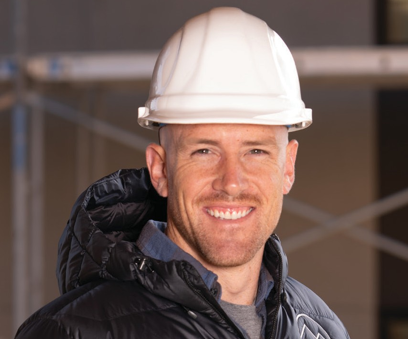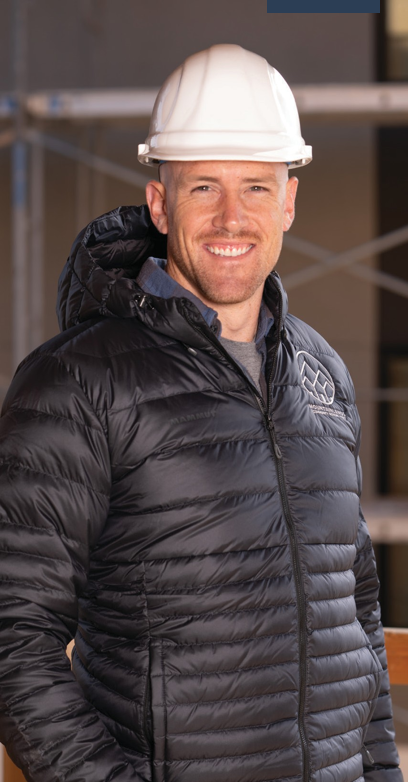
Pat Matheson works to help locals find housing in Park City
Mountainlands Community Housing Trust helps workers find safe, affordable housing
Winter/Spring 21-22
Written By: Darby Doyle | Images: Deborah DeKoff
Mountainlands Community Housing Trust (MCHT) Executive Director Pat Matheson knows first-hand the challenges people face when looking for reasonably priced housing in Park City.
“We were looking for a place that had two bedrooms for our small family, and literally there were only two apartments for rent that were year-round. The rest of them had a lease starting in March or April that terminates in November,” he says, noting that the apartments would convert to nightly rentals through the peak winter season.
Eventually, Pat and his family landed an affordable home deed (not through MCHT). “And that’s where we live now,” says Pat. “So, I work in affordable housing, and I’ve lived in affordable housing in Park City.”
The Utah native became the executive director of MCHT in May 2021 after four years with the organization. He took the reins from Scott Loomis, who retired from the position after 20 years.
MCHT’s work is based on the belief that economic self-sufficiency for families and individuals comes with safe, affordable housing. Founded in 1993, the nonprofit tackles the dual challenges of housing affordability and availability in Summit and Wasatch Counties (aka the Wasatch Back). Pat acknowledges that the word “affordable” is a relative term, especially in the context of the expensive Wasatch Back housing market.
Pat acknowledges that Park City workers priced out of living near Old Town face transportation challenges (especially in the winter) and that there are dire environmental impacts from the estimated 15,000 vehicles that drive up daily from the Wasatch Front. He also notes that a mountain town’s social fabric and support systems are eroded when the people who work there are pushed out of living and recreating there.
With that in mind, MCHT’s programs focus on developing areas for “attainable” housing and supporting a wider range of local needs — what he calls “housing equity.” Pat describes the organization’s three programming emphases: acquisition and new construction of affordable housing, assistance in securing housing and basic services, and education and advocacy for attainable housing policies. MCHT fulfills housing needs through subsidized rental units and deed-restricted housing developments.
For example, within Park City’s city limits, Pat estimates that two-thirds of single-family residences and condos are not owner occupied. He points out that this sort of disparity can deteriorate the bonds of a community, explaining how important it is to have neighbors you know and can count on and businesses with access to a happy and reliable workforce that lives close by.

“If you ask Park City council members, one of the things you hear is that they’re trying to keep this a ‘real town,’ not just a resort destination with a bunch of second homes,” says Pat, echoing the concern of many locals. “In Park City, even affordable housing is largely occupied by white tenants who even if they don’t have the financial means, at least have some ability to get their foot in the door. If English isn’t your first language or you work two jobs, that’s going to be even harder to try to get into affordable housing.”
One of MCHT’s most recent building projects — a 64-unit condominium development deeded for local workers — has 37 percent ownership by Latinx families and individuals. But even with projects like this, “There’s still a lot more work to do,” says Pat.
In addition to helping Main Street and resort workers, MCHT works in the smaller towns surrounding Park City. Pat says housing challenges are a “conundrum that rural, small towns like Kamas, Oakley, and Francis are also facing right now.” Family farms are being bought and subdivided to build million-dollar homes.
A demonstrated need for housing locals is also being tackled head-on in Heber, with a 49-lot subdivision prioritized for Wasatch County’s essential workers. Pat is understandably excited about the first phase of the development: “The buyers are employed at Wasatch County School District as second- or third- year teachers, are first responders like firefighters, and are public works department employees keeping things running.”
Pat says with a grin, “It’s so cool to see the people who educate our kids or who will save your life in a fire get a shot at owning their own home in the community where they work.”
IT’S ALL IN THE NUMBERS
Park City housing stats
- Average 3-bedroom apartment rental: $3,500/month*
- MCHT 3-bedroom apartment rental: $700 to $1,700/month
- Average condo sale price: $1,068,000*
- MCHT condo sale price: $265,000
- MCHT projects: 247 homes for sale + 319 rentals
- Next 2-3 years: about 100 more units
- Number of people served: thousands since MCHT was founded in 1993
*According to Pat Matheson, based on periodic reviews of the Wasatch Back rental market.

